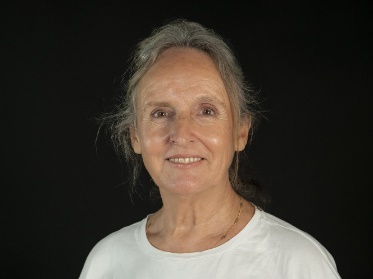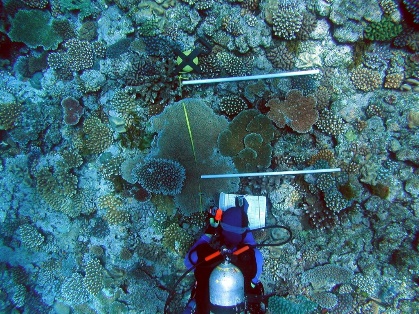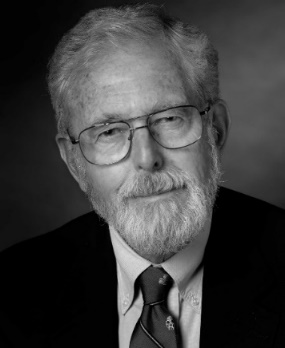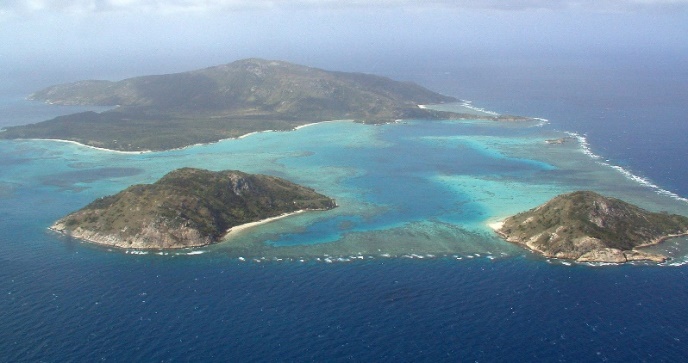After 50 years of research Australia’s coral reefs are still in hot water
The Australian Museum 2023 Talbot Oration: Coral Reefs in Hot Water Celebrating 50 years of the AM’s Lizard Island Research Station
Sydney, Wednesday 31 May, 2023: To celebrate the 50th anniversary of the Australian Museum’s Lizard Island Research Station (LIRS) and its critical impact on scientific research of coral reefs, Dr Anne Hoggett AM, Co-Director of the LIRS, will tonight present the third annual Talbot Oration: Coral Reefs in Hot Water.
During her Talbot Oration, one of the AM’s most important public lectures, Dr Hoggett will explore the plight and importance of Australia’s coral reefs, their complex biology and calls on the urgent need for action.
“Climate change is undoubtedly the major threat to coral reefs, but we’re moving at a glacial pace,” Dr Hoggett said. “Threats other than climate change are important too, and must be addressed, but unless we also get carbon emissions under control, those efforts will be largely useless. Now, more than ever, we have a responsibility to act – through urgent action on climate change, continuing to advocate for marine parks and adjusting our own behaviour at home. Reefs are too important and too beautiful to lose. We need to pull out all stops to keep them.”
The LIRS is part of the Australian Museum Research Institute (AMRI), led by Professor Kris Helgen, to facilitate coral reef research and education on the Great Barrier Reef – one of Australia’s greatest natural treasures and a World Heritage Area – and is key to the AM’s commitment to transforming the conversation around climate change. In addition to coral reefs, it has other important marine habitats including extensive areas of mangroves and seagrass beds. The Reef has amazing biodiversity and beauty including approximately 1600 species of fish, more than 350 species of hard corals and 4000 mollusc species.
As Co-Director of LIRS with her husband Dr Lyle Vail AM since 1990, Dr Hoggett has spent the last three decades bearing witness to the impact of climate change on our reefs and marine ecosystems. Along with Dr Vail, Dr Hoggett has tracked the devastating effects of threats like coral bleaching, cyclones, pollution, and Crown-of-Thorns Starfish outbreaks.
Dr Hoggett first visited LIRS in 1982 to collect specimens for the AM and to assist with Dr Vail’s PhD project. Dr Hoggett and Dr Vail married in 1984 and have lived and worked ever since on Lizard Island, where they raised their son, Dr Alex Vail, a marine biologist and BAFTA-award winning wildlife cameraman who regularly works with Sir David Attenborough and the BBC. This August the couple completes 33 years as joint Directors of LIRS.
“The AM’s LIRS is an important window into the changing ecology of the island and the Reef during a critical moment in history,” Dr Hoggett said. “It’s not just a place to study pristine and undisturbed reefs, it’s a place to study a reef that’s undergoing immense challenges. The first 50 years have been extraordinary, and I’ve been there for two thirds of them. It’s changed from an island that didn’t have any permanent habitation to an island that’s now world-renowned for scientific research.”
Every year around 100 research projects are conducted by approximately 400 international scientists and support personnel, and since 1973 there have been 2,700 scientific publications produced from work conducted at LIRS. This valuable information is used by reef managers to conserve coral reefs, which are an increasingly vulnerable resource due to stressors like human-induced climate change.
Director and CEO of the AM, Kim McKay AO, said the work undertaken on Lizard Island over the past 50 years has made an important contribution to global scientific research for the world’s largest coral reef system at a crucial time for our changing climate.
“This is a critical moment in history for marine conservation and the Great Barrier Reef, and the work at the Australian Museum’s LIRS led by Anne and Lyle is helping track of its health,” she said. “Their three decades of stewardship allows us to compare the Reef through time, which is extraordinary considering how much the world has been changing, how much the climate has been changing and how much humanity’s impacts on the oceans and on reefs is being felt. Australia holds a unique role as custodian of several reef systems, and the AM is proud of the work that has been done at the LIRS over the past 50 years creating an incredibly important legacy of data that will help us better understand and care for the Reef in decades to come.
“Science and research are important drivers of economic growth and are crucial to helping save our tropical reefs so that they can continue to provide sustainable wealth and enjoyment for future generations.”
AM Chief Scientist and Director of AMRI, Professor Kris Helgen, said: “Anne and Lyle have been integral in the transformation of the LIRS from an uninhabited corner of Lizard Island to one of the world’s best tropical marine field research stations. The work they have done – especially during the past decade of major global change – has been critical for helping the world understand the effects of climate change on the Reef.
“Most scientific studies unfold over a series of days, weeks or months. What makes a field station like Lizard Island – and the work Anne and Lyle have undertaken over the past 33 years – unique is that it draws upon decades of research, which is hard to come by in the world of science. It's even harder to come by in the richest natural ecosystems that we have on this planet. On rainforests, on land, and on coral reefs in the ocean.”
Highlighting advances in the field of climate change research and environmental conservation, the annual Talbot Oration enables the public to better understand how responses to the climate challenge determine our future prospects, health, and the sustainability of our natural environment.
The Talbot Oration will be held on Wednesday 31 May from 5.30pm-9pm. Following Dr Hoggett’s address at 6.30pm she will be joined by Sam Mostyn AO, businesswoman and sustainability advisor and a former President of the Australian Museum Trust, for a Q&A with the audience. The Talbot Oration is free to attend and spaces are limited. Visit the website to book tickets.
The 2022 Talbot Oration was delivered by author and social researcher, Dr Rebecca Huntley. Listen to her speech here. The inaugural Talbot Oration in 2021 was delivered by the AM’s Distinguished Fellow in Climate Change, Professor Tim Flannery. Listen to his speech here.
The Talbot Oration features as part of the Australian Museum’s Night at the Museum series where the AM invites guests to explore the AM with their friends from 5pm – 9pm, free of charge, every Thursday evening, until the end of June. Nights at the Museum is proudly funded by the NSW Government.
For more information on The Talbot Oration see here.
Celebrating 50 years of the LIRS, founded by Professor Frank Talbot AM
Lizard Island Great Barrier Reef, credit Charlie Shuetrim
Located 270 kms north east of Cairns on the northern end of the Reef, the Australian Museum’s Lizard Island Research Station (LIRS) has been a vital supplier of coral reef research and education for scientists and researchers from around the world since it was founded in 1973 by former Australian Museum Director, Professor Frank Talbot AM.
The LIRS began as a series of tents and a couple of modest buildings on the beach and has grown to become a globally-recognised research station devoted to understanding the incredible scale and structure of the Great Barrier Reef, a natural history icon seen from space.
LIRS was founded with seed funding provided by American philanthropists Henry and Jacqueline Loomis and it is part of the Australian Museum Research Institute (AMRI) to facilitate coral reef research and education on the Great Barrier Reef, one of Australia’s greatest natural treasures and a World Heritage Area, and is key to the AM’s commitment to transforming the conversation around climate change.
Lizard Island has been a research facility for thousands of international marine science students from all over the world over the past 50 years. Around 100 research projects are conducted annually by approximately 400 scientists and support personnel, and since 1973 there have been 2,700 scientific publications produced from work conducted at LIRS. This valuable information is used by reef managers to conserve coral reefs, which are an increasingly vulnerable resource due to stressors like human-induced climate change. Film crews also regularly use Lizard Island as a base for quality climate engagement documentaries.
The annual Talbot Oration is named in honour of Professor Talbot, who was Director of the AM from 1966-75 and Director of the Smithsonian Natural History Museum from 1989-1994. The establishment of the LIRS is one of Professor Talbot’s most notable achievements.
“The hugeness of the Reef and its incredible variety of life have provided us with a program for years of continuing research over my lifetime,” Dr Talbot said. “There were masses of stuff to learn when we first got there in 1973 and it's changed radically in the past 50 years. We must continue to study and learn from the science or we're going to have a very devastated planet to live on.”
# Ends #
Editor’s note: photos and footage here:
DR ANNE HOGGETT AM

ABOUT THE LIZARD ISLAND RESEARCH STATION

ABOUT THE TALBOT ORATION

Key Facts:
· After 50 years of research Australia’s coral reefs are still in hot water
· The Australian Museum 2023 Talbot Oration: Coral Reefs in Hot Water
· Celebrating 50 years of the AM’s Lizard Island Research Station
About us:
The Australian Museum owns and operates Lizard Island Research Station to facilitate coral reef research and education on the Great Barrier Reef. LIRS was established in 1973 on remote Lizard Island, located 270 kms north of Cairns on the Great Barrier Reef. It is a field research station and world-leading supplier of on-reef facilities for research and educationwhere visiting researchers from Australia and around the world carry out their research work. It currently hosts about 100 research projects each year conducted by more than 400 people. More than 100 scientific publications are produced each year from research at LIRS.
Contact details:
Claire Vince, Media Advisor
T 0468 726 910
E claire.vince@australian.museum



